
How do you know if you really love someone? It bugs me when people say, “You’ll just know,” as if everyone experiences love so clearly with a bunch of birds flying in a circle above their head. Many people have written in asking that big question, “How do I know if I love someone?” and today I’m going to talk about what the research says, my top three ways to know if you’re really in love with someone and what I think about soul mates. So stay tuned!
8-minute read
Ask Dr. Abby is the advice segment of the Relationships Made Easy podcast. Submit questions to [email protected]. (I keep it anonymous!)
Hi Abby,
I wanted to submit a question for an Ask Dr. Abby episode: How do you know if you love someone? A little context: I never had a serious relationship, and I am seeing a guy at the moment and I am not sure if I love him, or if I just want to be with him because I want a relationship, or if I just want to be with him because I am scared of being alone, or if I am tricking myself that I am not sure I love him because of fear of rejection. I know this might be a very basic question but not sure what to do about it.
Thank you so much,
Marcella (name has been changed, as always, to protect the innocent)
Being in Love vs. Being in Lust
First things first: if you’re trying to figure out if you really love someone, you need to make sure it’s love, not lust. Lust and sex are on the way to love but these are very different brain processes.
Biological anthropologist, Helen Fisher, Senior Research Fellow at the Kinsey Institute, has been studying our brains in relation to sex, love and relationships for decades. She’s identified three different stages in relationships, each with its own biochemicals and brain patterns. In other words, the brain of a person in lust looks different than the brain of a person in love.
The three brain systems she identifies are:
- Sex and lust
- Your feelings of attachment and trust
- Being in love and romance
You can learn all about how these work in detail, for now, I’m going to assume that you know the difference between all the limerence and euphoric feelings of lust and new love and how that’s different when you move to feelings of attachment and being in love.
That “in love” phase is generally all about strong physical heat, intrusive thoughts (you just can’t stop daydreaming about them), maybe feeling possessive and wanting to spend all your time together or getting jealous easily and a general sense of craving that person. Helen Fisher speaks about love being like an addiction.
The sex and lust “newness” stage of a relationship lasts about three years, max. If you stay together after that, you move into the attachment and trust stage. If you don’t see each other regularly or you’re in a long-distance relationship, that first, new phase often lasts longer than the three years. So, if you’re not sure if you’re in love or lust, check out my post on the honeymoon phase of the relationship. But if you know you’re not in the lust phase and you’re wondering if what you’re feeling now is truly love, then stay with me right here.
How Do I Know if I Love Someone?
Now we can get to the real question here: “How do I know if I love someone?” And to get more specific, as Marcella wrote in and asked, “How do I know if I just want to be in a relationship and am afraid of being alone? How do I know if I’m tricking myself or not?”
Attachment Styles are key to understanding yourself in relationships and how you show and receive love. It’s important to learn your style so you can understand yourself better!
Here are the three things to look for to figure out if you love someone:
1. You’re with them out of love, not fear.
You figure this out by working on your daily mindfulness and noticing your predominant emotions when you’re thinking about them or physically around them. How do you feel when you think about them? Is it warm and gushy or anxious and impatient?
What language do you use (either in your head or to others)? “I’m afraid that…”, “I’m anxious that…”, “I’m worried that…”. All of these are warnings that your motivations are from fear, not love. I want you to be with your partner because of inspiration, not negative motivation.
Also, you’re looking for someone to complement you, not complete you. You’re not looking for the other half of yourself. You’re a whole just the way you are! When we look for someone else to make us happy or fill in our deficiencies, we’re coming from that fear part of our brain again and that’s not love (of you or them).
In the same vein other warning signs of coming from fear, not love are:
- Rushing due to your biological clock
- Worrying you’ll end up alone
- You don’t consider it a successful life without having a romantic partner
- You’re upset that you’ve already put so much time in and don’t want to start over
- You think you need to settle because your expectations are too high. That might be true, so you need to focus on your top three standards: those are never too high.
2. They Hit the Love Trifecta
Robert Sternberg is a psychology professor at Cornell University, and he talks about the Triangular Theory of Love. This basically assumes that there are three components to love: intimacy, passion and commitment. I like this theory but not fully in the way it’s presented because passion, as it’s written in this theory, is about the sex/lust stage of the relationship and it makes you wonder: if I fall in love at 80 and don’t want to have sex, does that mean I’m not in love because I don’t feel physical passion for this person?
- But I do like the idea of passion for someone in a broader sense. This is someone we are focused on in a love-based way. If I think about the fact that I have a passion for cooking and relate that to the feelings I have for my partner, I like it better. This is something I’m interested in and that I spend a good amount of time thinking about and gaining skills around.
- Intimacy is feeling emotionally close and connected to your partner, which I definitely think is part of being in love and…
- Commitment speaks to the decision you make to love each other and to commit to staying together. It’s a commitment to approach life as a team, a partnership – it’s knowing that this person, no matter what, has your back.
3. You feel empathy
You feel compassion and care how they’re doing. In other words, you’re mindful of your partner’s emotional climate. What makes them happy? What makes them anxious or upset? You’re not codependent (that’s fear-based); instead, you want to support them in feeling safe and satisfied.
What About Soul Mates?
I get asked a lot about soul mates and being in love. I think the notion of soul mates has really fucked people up when it comes to love.
The idea of having “a” soul mate comes from scarcity and a fear-based brain. It comes from this idea that there’s one person out there for you and, if you blow it, you’re screwed. This notion keeps people in unhealthy relationships, has them lower their standards, and creates self-doubt and regret. If you take a moment and hear those words, you can see that these words have nothing to do with love.
So, let’s talk about love. Love is expansive, open, willing, eager, thoughtful, fun, kind and gentle. Love-based relationships are built on feelings of cooperation, compassion and connection. When we start getting worried that we’ve missed the boat or anxious that we’re not trying hard enough to keep our partner, those aren’t love-based thoughts or feelings and they’ve got no room in your relationship.
There isn’t one perfect person out there for you. You’re not missing a piece of yourself without them and you’re not half a person waiting for the other 50 percent. This idea that you’re a lock and they’re the key that will open you up or that you’re the hand and they’re the glove are concepts grounded in fear. They say that you’re not enough on your own or that you’re not complete unless you’re in a (long-term) romantic relationship. These ideas are grounded in oppression, misogyny and fear and they have no place in a love relationship.
But I’m not saying you can’t have a soul mate. I’m saying that you’re going about it all wrong.
You don’t find a soul mate. You create a soul-mate relationship, together.
I think you can have many soul mates, it’s all about what you create with another person. Instead of going in expecting or needing them to be a certain way, which will surely set you up for disappointment eventually, go in with an open heart and a goal of co-creating your relationship.
And I would offer you this. Instead of thinking about what you’d like in a soul mate, think about who you’d like to be in a soul mate relationship.
- How do you want to show up?
- How do you treat your partner?
- What thoughts do you think about your partner?
- Are you calm and laughing every day?
- Do you feel confident and connected?
- How do you speak to your partner?
- How do you resolve disagreements?
- How do you know you’re loved and cared for and how do you show that yourself?
- How do you think about yourself each day in this relationship?
- How are you leading to love every day?
Your soul mate relationship is something you co-create every single day. And don’t forget, you can also create soul mate relationships with your friends. Deepening all our relationships, showing up as whole loving humans and loving ourselves…. That’s how we create our soul mate(s).
The world is abundant with love and deep connection. Start with you and your soul mates will be everywhere.
Resources
Finding the Spark Again in Your Relationship (or for the First Time)
What to Do When the Honeymoon Phase Ends in Your Relationship
How Attached Are You in Your Relationship?
How 5 Minutes of Mindfulness a Day Can Make Your Relationship Great
How to Make Mindfulness a Habit
You’ve Got to Have High Standards and Low Expectations
How to Practice Loving Detachment
5 Signs You’re in an Unhealthy Relationship (and 5 Simple Ways to Fix It)







